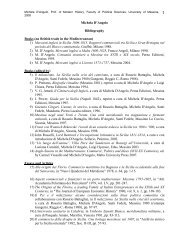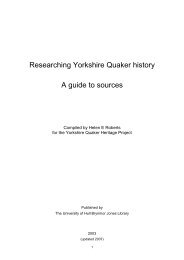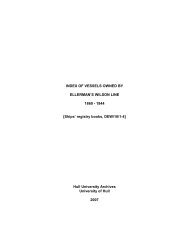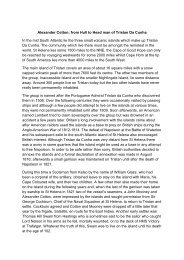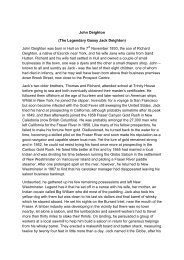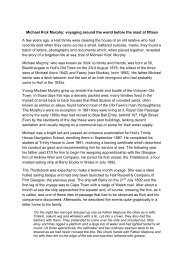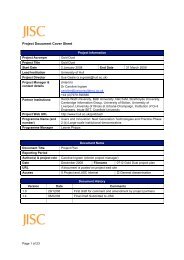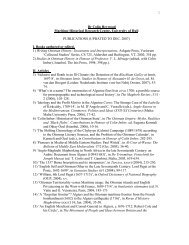The North Atlantic Fisheries, 1100-1976 - University of Hull
The North Atlantic Fisheries, 1100-1976 - University of Hull
The North Atlantic Fisheries, 1100-1976 - University of Hull
You also want an ePaper? Increase the reach of your titles
YUMPU automatically turns print PDFs into web optimized ePapers that Google loves.
In 1719 the States General forbade the export <strong>of</strong> brine and string for nets,<br />
and in 1725, drift nets. Import and export <strong>of</strong> bands for barrels was<br />
forbidden in 1750. Impost on victuals and salt for herring vessels was<br />
abolished as were export duties on salted herring. <strong>The</strong>se measures were<br />
introduced between 1750 and 1754. <strong>The</strong> un<strong>of</strong>ficial rule, dating back to<br />
1663, that only Great Fishery members could gut their herring was<br />
hardened into a monopoly.<br />
Financial support was introduced by the provincial authorities. In the<br />
1750s the States <strong>of</strong> Zeeland began to pay their provincial fishermen a<br />
bounty per vessel. <strong>The</strong> financial consequences for Zeeland were<br />
calculable, for the number <strong>of</strong> vessels was small. Britain had set an<br />
example. <strong>The</strong> States <strong>of</strong> Holland did not immediately follow. For the bulk<br />
<strong>of</strong> the fisheries was settled in that province. In 1775, however, Holland<br />
could no longer abstain from financial support. A herring shipowner<br />
would now receive a bounty <strong>of</strong> 500 Dutch guilders for each vessel<br />
equipped in a certain year. In 1788 this measure was extended to the<br />
Icelandic cod fishery. Whaling vessels were treated accordingly. 192<br />
<strong>The</strong> effect <strong>of</strong> state protection and support is uncertain. <strong>The</strong> best one<br />
can say about it is that it may have slowed down the decline. Neither the<br />
regimes installed by the French around 1800 nor the new kingdom <strong>of</strong> the<br />
Netherlands changed the policy. Also the coastal fishery could now rely<br />
upon bounties. <strong>The</strong> regulations around gutted and ungutted herring were<br />
even extended. <strong>The</strong> fisheries walked down a dead-end road. Various<br />
shipowners needed the bounty to balance expenses and the catch’s yield.<br />
For the coastal fisheries from the 1820s to the 1850s current research is<br />
going to prove that it could not have survived without bounties. Only by<br />
a combination <strong>of</strong> trawl and drift net (for the ungutted salted herring)<br />
during the year plus the bounties did fishermen and shipowners survive.<br />
Without bounties government would have had to spend more on<br />
poor-relief, a contemporary observed.<br />
After the 1848 “revolution”, liberal ideology ran through ministries.<br />
<strong>The</strong> fisheries were one <strong>of</strong> the most protected industries. <strong>The</strong> bounties<br />
should disappear and the value <strong>of</strong> all existing laws and regulations be<br />
seriously reconsidered. In February 1854 a state commission began this<br />
work. Seven months later its report was ready, advising the abolition <strong>of</strong><br />
laws and regulations and pleading liberty. One regulation, however,<br />
should be maintained. Inspection and control <strong>of</strong> the quality <strong>of</strong> the<br />
192 De Vries, De economische achteruitgang, 147-49.<br />
115




